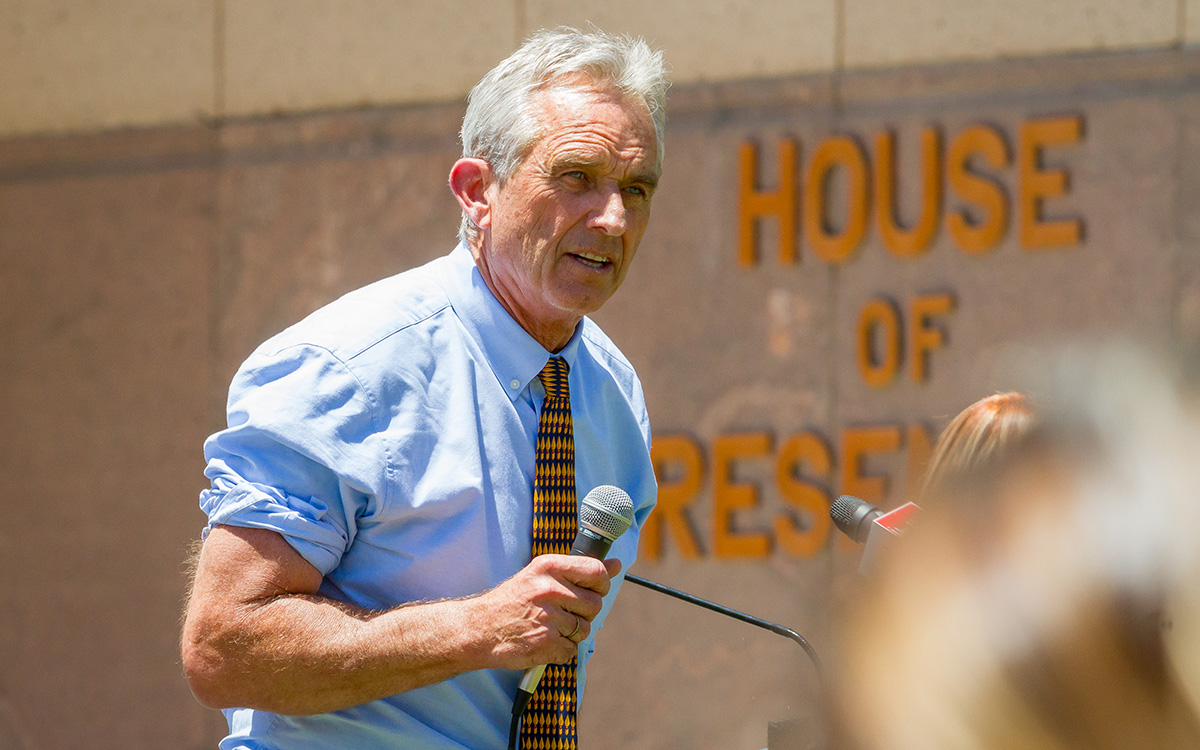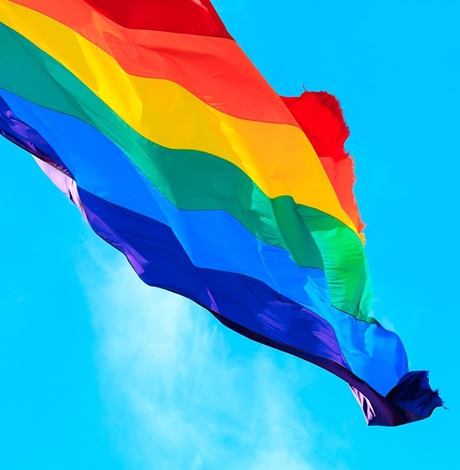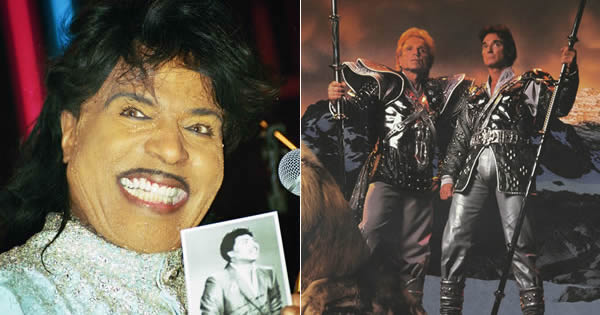Opinions
Feminist, trans advocates should support Bradley Manning
Wikileaks suspect sought to create a better-informed democracy
By Rainey Reitman
Some thoughtful feminist scholars have recently called on the Bradley Manning Support Network to begin referring to the accused WikiLeaks whistle-blower with a female pronoun. Emily Manuel’s essay in Global Comment highlighted why many of us who strongly support transgender rights are sensitive to the pronouns we use when we refer to Manning.
As an ardent supporter of Bradley Manning and a feminist, I have given this issue a great deal of thought. Given the unusual and perhaps unprecedented circumstances of the situation, I wanted to explain why I’m still calling him Bradley. In so doing, I also hope to demonstrate why folks who care passionately about queer and transgender rights should come out in support.
First, we should bear in mind the basis upon which some have made suppositions about Manning’s preferred gender identity. By and large, we are dealing with evidence that has not been established as fact. We can look at some Google searches found in forensic evidence, a smattering of late-night private chat logs, and potential testimony from those in whom Manning may have privately confided.
If these materials are to be believed, then it appears that Manning was questioning his gender identity. Manning’s lawyers have noted that he had sought counseling, but we don’t know if any final decision was ever made. We don’t know whether Manning wanted “Breanna” to be a primary identity, or if this was an alter ego that was never meant to be indicative of primary gender identification. We do know — from our own private conversations with friends and family members — that prior to his incarceration, Manning had not asked people to refer to him with a female pronoun.
The decision to transition – especially when it entails life-changing hormones or even surgery – isn’t something undergone lightly or quickly. Like many who are unsure about their gender identification, Manning used the Internet as a sandbox to begin experimenting with these complex issues. Unfortunately, he was arrested and forced to undergo many torturous months in solitary confinement, without proper medical, social, and emotional support during this time of questioning. We don’t know whether he reached a final decision.
From the earliest stages, the Bradley Manning Support Network has sought to honor Manning’s choices. Early in the campaign, we reached out to Manning’s aunt and lawyer and asked what name he preferred we use in our advocacy. They got back to us to say that “Brad” or “Bradley” would be fine.
Since then, we’ve sent Bradley packages in the mail showing him the fliers, stickers, postcards, T-shirts and photos of rallies all emblazoned with the name “Bradley Manning.” Manning has issued three public statements since his incarceration: during his first Christmas behind bars he issued holiday wishes; after many long months in solitary confinement he released a multi-page letter describing his abusive conditions; and after the pretrial hearing in December, he communicated through his aunt that he appreciated our support.
Notably, he didn’t ask us to start referring to him as Breanna. Advocates for Manning have an obligation to respect his agency and use the pronoun he had preferred prior to his arrest. None of us has the right to switch pronouns for Manning unless he tells us otherwise.
We also need to bear in mind that PFC Manning is currently – and quite literally – fighting for his life. He faces ridiculous charges of “aiding the enemy,” which carry a maximum sentence of death, despite the fact that our government’s own impact assessments found no harm to national security from the WikiLeaks materials. This extreme retaliation against Manning for uncovering war crimes stands in stark contrast to the military’s recent decisions to let other soldiers, who have admitted to killing unarmed civilians, walk free with nothing more than a cut in their pay.
This is not the normal legal environment that we may remember from our high school civics class. This is a show trial of a political prisoner. The military is openly abusing Manning of his rights in order to create a calculated psychological impact, and no doubt as a sharp warning to others who might consider exposing crimes and corruption.
Manning has been subjected to prolonged solitary confinement, which carries the risk of severe psychological damage. During that time, he was on several occasions ordered to remove his clothing and stand at “parade rest” in front of his guards. Those in the military know that this position requires you to place your hands behind your back. By all accounts, PFC Manning was the only detainee at the Quantico brig who was subjected to this peculiar form of humiliation. Military officials have since refused to turn over video-recordings that they made of these incidents.
It is difficult to conclude that this very specific form of degrading treatment has nothing to do with the fact that Manning was known to be questioning his gender identity.
When pressed on the mistreatment at a White House press conference, President Obama suggested that these absurd measures were imposed on Manning for his own safety. This excuse contradicted the findings of brig psychiatrists tasked with evaluating Manning, who found on every occasion that he posed no threat to himself in custody.
In this environment, those of us who have the luxury of relative freedom need to recognize that Manning might not be able to say everything that he really wants to say. In fact, we know this to be true. There have been several occasions in which meetings between Manning and his attorneys have been recorded by the military. Military officials have blocked Juan Mendez, the United Nations Special Rapporteur on Torture, from having a private meeting with PFC Manning. Manning has rejected an offer from the military to allow him to meet with Mendez on the condition that the meeting be monitored.
In short, Bradley Manning is being silenced. Whether through these direct restrictions on his ability to communicate freely, or more subtly through media narratives that attempt to erase his political agency, the establishment does not want us to hear Manning’s true voice.
Each one of us working with the Bradley Manning Support Network anxiously awaits the day when Bradley Manning can speak freely, unencumbered by the shackles of oppression and injustice. But until that time, we can’t presume to speak for him, especially on an issue as personal and yet political as gender identification.
Lt. Daniel Choi, who was discharged from the Army for being openly gay, recently called on the queer community to stand up for Bradley Manning. In an interview with Keith Olbermann, he decried the media’s portrayal that Manning’s sexual or gender identity was being used an excuse. He instead noted that Manning had displayed the highest level of integrity in his actions:
“I think at this point we can’t say that he did any of this or didn’t do any of this because he’s gay or transgender. He did this because he’s a good soldier… I’m proud of him as a gay soldier because he stood for integrity. And Keith, one thing about the gay community is that our community, among all of the communities in the world, we’re the only one that bases its membership -— its membership — on integrity and telling the truth about ourselves, declassifying that information for the betterment of our entire lives and societies and families. And when we do that, we realize that the gay movement is more important than just for gay people alone.”
All available evidence points to Manning being driven by integrity. At the Article 32 hearing, military prosecutors submitted a note allegedly attached by Manning to the materials they say he sent to WikiLeaks concerning the wars in Iraq and Afghanistan. It read:
“This is perhaps one of the most significant documents of our time, removing the fog of war and revealing the true nature of 21st century asymmetric warfare.”
This seems to be the core motivation for Manning: to enlighten and educate the world, to create a better-informed democracy, to shed sunlight on the darkness covering our foreign policies and ongoing wars overseas. And, as queer activists have long known, there is power and transcendence in choosing truth, even when that truth makes others uncomfortable.
Rainey Reitman is a writer and a feminist. She sits on the Steering Committee of the Bradley Manning Support Network.
Opinions
Open or closed? No, not your bar tab
The swinging couple’s dream is the hopeless romantic’s nightmare

(Editor’s note: This is the first of a two-part feature on open relationships.)
Boy meets boy. Boy likes boy.
For the first time in a long time, boy feels that thing, that connection, that spark with boy.
Then one day boy grabs dinner with boy. Boy’s smiles and laughs throughout are equal parts sincere and excited. Boy wonders, is this the one? After all this time, has it finally happened?
Boy takes boy home. Boys cuddle. Boys kiss. Boys have amazing sex. And in the glowing aftermath of what can only be described as a perfect night, boy spots an unnoticed ring.
“What’s that?” boy asks.
“My wedding ring,” the other replies. “I thought you knew.”
When I returned to D.C. in 2016, I quickly received a lecture on why open relationships were the future of queer love. Nearly eight years later, they’ve more than just sprouted among the gay scene – they’ve overtaken the landscape. Simultaneously, what became the swinging couple’s dream descended into the hopeless romantic’s nightmare.
It’s not all so bad given what comes with it: a lot of sex, particularly with hotties who were off-limits before. However, alongside that sex comes a minefield of rules and regulations open couples create but horny singles must abide by. One wrong move, and you’re the villain.
Truthfully, I’ve soiree’d with open couples before, both separate and together. On the bad end, things get awkward – particularly between me and the other partner. On the good end, I might come home satisfied, but the moment I hop on my couch to watch rerun television, I realize I’m back to where I started: alone.
If you’re like me and not yet onboard with an open relationship, it’s also easy to feel like a fish out of water. Queer social outings can sometimes become a Swinging 70’s Redux, with partners passed around like gay dishes at a potluck. Next up: ass, and lots of it.
This leads to another issue: in a scene full of open couples, detached sex is more than just accepted – it’s often expected. The moment you let emotional attachment enter the equation, you lose. Now even the singles are trained to run away, for your attachment may prevent them from jumping onto – or into – the next in their queue. And I can’t even get upset, for I’ve been that guy before.
For all these reasons, I wanted to dive further into the rise of open relationships. All I needed was someone in an open relationship willing to speak on the matter.
“That’s easy,” quipped my coworker, Chad. “Just open Grindr.”
Chad and I met working at the pub, and under similar circumstances; he lost his day job a few months after me losing mine. We quickly found solace in our shared circumstance, and now he and I hang in the kitchen of a gay bar divulging details of our sex lives and pining to meet the man of our dreams.
And Chad wasn’t wrong, for these days Grindr is chockfull of profiles in open relationships looking to play. Yet it turned out I wouldn’t need Grindr, for at that moment, in pranced our fellow coworker, Scott.
There’s no better way to describe Scott than this: They’re a bundle of positivity and joy. Oddly, I didn’t meet Scott at the bar but rather at a coffee shop in Petworth in 2018, where they were my regular barista. Little did I know we’d work together half a decade later. Life is funny that way, isn’t it?
Outside the bar, Scott is an actor in productions across the DMV. Naturally, they became my biggest inspiration for abandoning my career for the arts. Following a bar shift last summer we smoked a blunt and talked about it. They taught me to tune out the noise and follow my heart.
Together, Chad and Scott became my newfound support system. In a way we’re like the Three Musketeers – equally gay, just a lot more working class.
Of course, as soon as Scott entered, I had to ask: “Are you and your partner open?”
Scott smiled coyly. “Oh yes, honey.”
So as fate had it, here in the kitchen of a gay bar, I had both ends of the open/closed spectrum represented. On one side Chad, a self-proclaimed romantic seeking monogamy; on the other, the fully open Scott.
While there were many takeaways from our conversations on the matter, I distilled six truths in the debate between open and closed relationships. But please, take these with a grain of salt – I am just a barback, after all.
- Monogamy is rooted in tradition.
For many of us, gay or straight, finding our one and only was a dream of our youth. Mine was supposed to be Colby Donaldson from season 2 of the hit TV show “Survivor,” but life had other plans.
Yet many never dissect where this desire stems from. Our culture is inundated with stories of princesses rescued by their prince and true love’s kiss setting us free. There seemed to be a script we had to follow, and if we didn’t, no worries – God would simply banish us to hell.
This is a common starting point for both the monogamist and the open connoisseur. When I asked Chad what drew him toward monogamy, he replied, “Honestly, it was how I was raised: settle down, have kids, and carry on the family name. I didn’t have any non-traditional role models.”
Meanwhile, Scott’s past reservations toward open relationships were for similar reasons. “When I was younger, I was not pro-open relationship,” they told me. “I didn’t understand the intricacies of it. I didn’t understand the nuances of it. I also grew up in a very conservative, Catholic household.”
Both responses touch on a key argument in the pro-open saga: that closed relationships are often reflections of tradition, ranging from folklore to religion, and these traditions held queer people back for centuries. If queer means subverting these traditions, then monogamy is simply outdated. Or so they say.
- The desire to be open is biological.
Over time, Scott’s views on being open changed. “As I matured and grew into my queerness,” they started, “and saw friends with alternative lifestyles, I realized this is something I could be interested in.”
In Scott’s relationship, this led to an understanding of the core needs for them and their partner. “I knew my partner’s libido was higher than mine. For me, it came from a desire to allow my partner to experience something I wasn’t able to fulfill fully. I personally get a lot of pleasure knowing my partner can go out, meet people, and make connections, knowing at the end of the day we will be each other’s number one priority and person.”
Scott’s libido reference made me wonder: are open relationships taking off across the LGBTQ community, or specifically among sex-obsessed gay men? Realizing this conversation should probably be more inclusive, I made an arduous journey east – roughly 150 feet, to the front entrance.
Kelsey is a hot badass who works the door of the bar. She’s stylish, a fellow Aires like myself, and I once told Chad I thought she was Fabulous with a capital F. I realized then I’m getting gayer by the minute.
While Kelsey is currently in a closed relationship, she enlightened me to the status among lesbians. “It’s about 50/50 with the ones I know,” she replied. Honestly, this surprised me, mainly because I figured men were the ones dicking around.
Kelsey has also been in open relationships before, and she isn’t exactly closed to that route again. “I don’t think people were made for one person for the rest of their life,” she added. This reflected what Scott shared as well: “The human body craves sex to different degrees, and as you get older those degrees wax and wane.”
To me, both statements highlight that the desire to be with others sexually is natural for many, so caging that desire can feel confining. As queer people, we can all relate to that.
Next week: Part two looks at finding the right reasons for pursuing an open relationship.
Jake Stewart is a D.C.-based writer and barback.
Opinions
RFK Jr. a dangerous spoiler helping Trump
A reckless man now on the ballot in several swing states

Robert F. Kennedy Jr. is an embarrassment to his family, and to so many others like me who supported his father and uncle. He uses his last name to try to gain credibility and that is sad.
His real claim to fame is being an anti-vaxxer and lying about what impact vaccinations will have on the health of the American people. Were it up to him, and God forbid he had been president during the COVID-19 pandemic, millions more Americans would have died. Because of his dangerous lies, many more will die of diseases once nearly eradicated, like measles.
Listening to RFK Jr. is difficult because of his voice. The cause of that is Spasmodic dysphonia, a rare neurological condition, in which an abnormality in the brain’s neural network results in involuntary spasms of the muscles that open or close the vocal cords. He has said, “I feel sorry for the people who have to listen to me.” I am also sorry for people who listen to him, but not because of his disability. I am sorry for those who listen to him because of the garbage he spouts when he speaks. He is actually a man with dangerous ideas, and one whose outsized ego could end up getting us Donald Trump as president.
Kennedy is an environmental lawyer who recently made the bizarre statement, “Biden is a ‘much worse’ threat to democracy than Trump.” Like Trump, Kennedy is forever making statements like that and then trying to weasel out of them like he has with this one. The statement reminded me of when Susan Sarandon said in 2016, “there is no significant difference between Donald Trump and Hillary Clinton.”
Kennedy recently sent out a campaign email saying the Jan. 6 Capitol Hill rioters were simply “activists.” Then when the blowback got too strong, he blamed that on someone else. Kennedy is a lawyer with no real government or foreign policy experience. Unfortunately, that doesn’t seem to matter to many Americans, even though Trump clearly proved it should. We live in an often dangerous, and very complicated, world. A president has to deal with issues that could mean life or death, such as the wars in Ukraine and the Middle East.
Like Trump, RFK Jr. is on his third wife. His current wife is the talented actress, Cheryl Hines. When asked whether she agrees with his views Hines said, “there are some political topics she differs on with her husband, which she did not disclose.” She did mention one and referenced “the time Kennedy, made a comparison to the Holocaust while delivering a speech at a rally against vaccine mandates. She assured her Twitter followers she found the comparison ‘reprehensible.’ We can all agree it was reprehensible but so is much of what RFK Jr. says.
Kennedy recently named Nicole Shanahan as his running mate. Her ex-husband is Sergey Brin, one of the founders of Google. She is a California lawyer involved in the tech field. It looks like she bought her way onto the ticket donating millions of dollars, including $4 million, toward the Super Bowl ad Kennedy produced. He will use her money to help get him on ballots across the nation. As of April 10th Kennedy is already on the ballot in Utah, and his campaign has gathered the necessary signatures to be on the ballot in New Hampshire, Nevada, Hawaii, North Carolina and Idaho, according to a recent campaign news release.
If he gets on swing state ballots, it heightens his chance of being a spoiler. The reality of this was touted by one of his staffers who when talking to a group of Republicans about the campaign in New York, said “The only way that Trump can even see the remote possibility of taking New York is if Bobby is on the ballot. If it’s Trump vs. Biden, Biden wins. Biden wins six days, seven days a week. With Bobby in the mix, anything can happen. How do we block Biden from winning the presidency? Again, that’s the number one priority for me.”
After the blowback, Kennedy said she didn’t speak for the campaign and let her go. But in reality, when looking at who to choose as my candidate I look at the people he/she surrounds themselves with. Who is advising them? I guess for Kennedy it doesn’t really matter since he won’t be elected. But it is time people like Kennedy stop trying to fool the American people into thinking they could win.
He will simply get the political epitaph ‘Spoiler’ if Trump wins. No one will remember him for anything else. Let’s pray, and work hard, to see that doesn’t happen.
Peter Rosenstein is a longtime LGBTQ rights and Democratic Party activist. He writes regularly for the Blade.
Opinions
The High Road – Walking the Pathway to National Cannabis Legalization
Grassroots organizing has been the driving force behind shifting public perception and pushing for policy changes in the cannabis industry

As we gear up for a major election year, the buzz around cannabis legalization is getting louder. Policymakers are starting to see the need for comprehensive reform, while advocates and small business owners in the industry are cautiously optimistic about the future. But let’s not kid ourselves, this system was designed to keep certain communities out, and it’s crucial that we continue to address these deep-rooted inequities as we blaze the trail forward. A step towards legalization that doesn’t prioritize equity and dismantle the barriers that have held back marginalized groups would be a major bummer. In this op-ed, we’re going to take a groovy journey through the evolution of grassroots organizing in the cannabis industry and highlight the importance of social equity in achieving true national cannabis legalization and boosting our humanity along the way.
Over the years, I’ve been right in the thick of it, helping to build grassroots organizations like Supernova Woman and Equity Trade Network. These groups have been on the frontlines, fighting for cannabis programs in Oakland and San Francisco. I’ve also rocked my own brand, Gift of Doja, and organized the first Cannabis Garden at a major neighborhood street fair, Carnaval San Francisco. I even served as the chair of the first Cannabis Oversight Committee in the nation. But the real magic has always happened in when working in coalitions. Each individual and organization brings a unique piece to the puzzle. Grassroots organizating is as challenging as crafting a democratic society but is worth the effort in generating workable implementable solutions. Collective efforts have been game-changers in shifting public opinion and paving the way for major policy changes at both the state and local levels.
As we navigate the path towards cannabis legalization, lobbyist and lawmakers can’t forget about the small business owners who have been grinding to build their dreams. Political advocacy and lobbying are important, but if we’re not uplifting the voices and experiences of those who have been fighting on the ground, we’re missing the mark. Big companies can hire lobbyists, but small business owners don’t have that luxury and if we are not in the room we are on the table. Coalitions allow for us to be in the room when we can’t physically be there. Our communities, especially people of color, have been hit hard by systemic oppression, from over-policing to mass incarceration and limited economic opportunities to limit our ability to be in the room of power and decision making.
Social equity needs to be front and center in any cannabis legalization efforts. It’s not enough to just remove criminal penalties or create a legal market. We need to actively work on repairing the damage caused by years of prohibition. That means fighting for resources, investment, and low-interest loans for small businesses. It means creating a tiered fee and tax structure that doesn’t crush the little guys. And it means opening up equity programs to all industries, not just cannabis. Social justice without economic access and repair is like a joint without a lighter – it just won’t spark the change we need. We have a responsibility to evolve the economy and break down unnecessary barriers. Activism, social justice, and economic reform are all connected, man.
Industry leaders, culture creators, advocates, and consumers alike, we all need to step up and promote social equity. It’s on us to support initiatives that provide resources, mentorship, and funding for individuals from affected communities to enter the legal cannabis market. And let’s not forget the power of our wallets. Buying from companies that align with our values and support the work we believe in can send a powerful message. Voting with our dollars might just be more impactful than showing up at the ballot box.
As we head into a major election year, the cannabis industry is at a crossroads. It’s a time for drumming up voter interest and for candidates to make promises that grassroots organizations have fought hard for. Small business owners will be navigating a tricky landscape, but we can’t lose sight of the power of collective work. By keeping social equity at the forefront, we can undo the harms of the past while building new frameworks that will shape a brighter future for all.
In conclusion, grassroots organizing has been the driving force behind shifting public perception and pushing for policy changes in the cannabis industry. But let’s not forget that true national cannabis legalization can only be achieved if we address social equity. It’s time for us to come together, listen to the voices of those most impacted, and walk the high road towards a future where cannabis legalization isn’t just about business opportunities, but also about healing and empowerment for all communities. Let’s light up a joint of social justice and blaze a trail towards a better tomorrow.
Nina Parks, Co-Founder of Equity Trade Network & Supernova Women [email protected]
-

 Africa4 days ago
Africa4 days agoCongolese lawmaker introduces anti-homosexuality bill
-

 District of Columbia21 hours ago
District of Columbia21 hours agoReenactment of first gay rights picket at White House draws interest of tourists
-

 World4 days ago
World4 days agoOut in the World: LGBTQ news from Europe and Asia
-

 Arizona1 day ago
Arizona1 day agoAriz. governor vetoes anti-transgender, Ten Commandments bill









